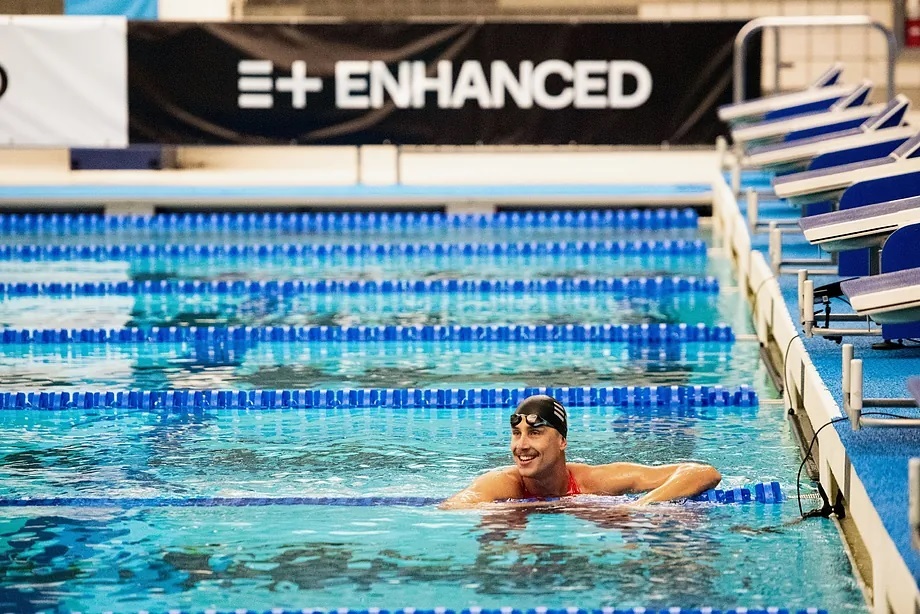In December 2022, Aron D'Souza was lifting weights in a gym in Miami when he noticed several forty-something bodybuilders sharing the space with him. His innate curiosity led him to ask them what they did to achieve that body, that strength, and they told him about substances to enhance performance. That conversation clicked with him and brought back other memories he had been accumulating in his brain, like the article by Oxford professor Julian Savulescu mentioning the possibility of allowing the use of doping substances in the Olympic Games.
So that Christmas, at the beach house he rents every year, D'Souza began shaping that idea and created a business plan on a sheet of paper. Two people saw that first sketch: his father, a medical professor, and Peter Thiel, founder of Paypal, investor, and friend with whom he has shared a New Year's Eve dinner for 15 years. If Thiel thought it was "a great idea," his father replied, "The day you manage to do it, you will change the world." Recently, Donald Trump's son invested "millions with two digits" in that sheet of paper that is now a company of over 30 people based in New York, and the expectation has become a reality.
In a year, on May 21, 2026, the Enhanced Games or Enhanced Olympics will be inaugurated, which their detractors label as the Doping Olympics. "They are not a competition, they are a movement," points out its founder. It is a competition where taking performance-enhancing substances prohibited in the world of sports is allowed, although there is also the possibility to compete 'naturally'.
It will be a four-day tournament in the American city of Las Vegas, where the necessary facilities will be built to host: swimming, with 50 and 100 meters freestyle events; athletics, 100 meters and 100/110 hurdles, and weightlifting, in its Snatch and Clean and Jerk modalities. "We have a mission, to build superhumans," says D'Souza to EL MUNDO and adds, "It is not just about creating a new sports event or making money, it is, literally, about creating humans 2.0 and reinventing everything, from sports to what it means to be human."
Around 100 athletes are expected to participate in this first edition. However, they maintain that their names will be revealed closer to the competition because, as of today, they have only made public the signing of four swimmers. They are James Magnussen, a swimmer and Olympic medalist in London 2012 and Rio 2026 and the first athlete to sign up for this idea; Bulgarian and European swimming medalist, Josif Miladinov, the world record holder in the 50 butterfly, Andrei Govorov, and Greek swimmer Kristian Gkolomeev.
Gkolomeev is not just any athlete in the Enhanced world. He has been chosen to surpass human limits and reaffirm the principles of this type of championship. On February 25 of this year, at the Greensboro Aquatic Center (North Carolina), the Greek swimmer of Bulgarian origin broke César Cielo's world record in the 50 meters freestyle, which had been standing since 2009, the era of super suits. The athlete lowered the time by two hundredths from 20.91 to 20.89. "It was the result of using technology, good training, and the use of doping substances," they assure from an organization that wanted to capture the entire process in a one-hour documentary that was made public at the launch of these Games.
As a reward for this achievement, Gkolomeev received one million dollars from the Enhanced company, an amount they plan to pay to any athlete who breaks the world record in the 50 freestyle or 100 meters flat in the upcoming games. In addition, each event will have half a million in prizes, with $250,000 for the gold medalist. "We pay our athletes and are willing to share the wealth with them. In the Olympic Games, an athlete earns an average of $30,000 a year while the Committee president is flying in a private jet. We have designed an economic system that supports long-term sustainability and, therefore, the health of our athletes," explains D'Souza.
This last aspect is precisely one of the most criticized by the traditional system. The future health of athletes who take doping substances. "There is only one message: if someone is foolish enough to want to be part of it, they will be suspended for a long time," said Sebastian Coe, president of World Athletics. In addition to the ban, the former British middle-distance runner insults athletes who, he believes, are putting their physical integrity at risk.
D'Souza first responds from the basic principles of each person's freedom to do with their body as they wish. But then he asserts that the supervised use of doping substances, in fact, they have an Independent Medical Commission that oversees this, can mean an improvement in health not only for athletes but also for ordinary citizens. "The same drugs that allow athletes to run faster and jump higher will also allow individuals to be healthier, stronger, work longer, and have more productive lives," he adds.
Thus, it is difficult to categorize the purpose of the Enhanced Games company, "a dream" for which D'Souza has risked "his professional reputation" as a lawyer and manager of a multimillion-dollar fund. "The goal is not only sports-related but also health-related. "Do I want to live to 100 in a broken body, lying in a bed? No. Would I live to 100 if I could have my 25-year-old body? Absolutely," he concludes.
